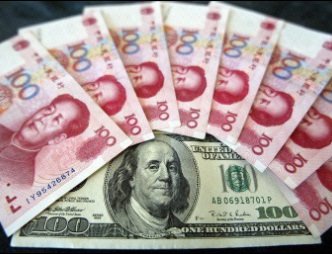
Earlier this month, China created a ripple in the global financial market by devaluating its currency by 3.5 percent in two days. The global market immediately went into a tizzy. Debates started raging as to what extent the move by the People’s Bank of China (PBC) would hamper other economies with panic stricken stakeholders suggesting that this could even ignite a currency war in the global scale. While the PBC stated that the intention of the devaluation was simply to keep the Yuan ‘more stable’, the real reasons were more than obvious.
Having recorded double digit growth as high as up to 14.2 percent in 1992, the Chinese economy has been slowing down in recent years. It reached a tipping point this year when data released by National Bureau of Statistics showed that the economy had slumped to a 24 year low to 7.4 percent in 2014. As exports significantly contribute to the Chinese economy, one of the inferences of the economic slowdown was that the Chinese exports were gradually decreasing in the global scale. The contribution of exports and FDI to the growth of the economy rose from 18 percent in 2001 to its peak at 49 percent in 2004. Similarly, exports and FDI together contributed to over 53 percent to the impressive recovery of the Chinese economy in 2010.
In July, this export tumbled 8.3 percent compared to a year ago. Adding to the woes, in the last one year, Chinese currency strengthened against other Asian currencies by more than 10 percent indicating that their exported goods were further expensive. All of this was a perfect recipe for panic amongst the Chinese leadership. In a desperate attempt to make its goods cheaper in the competitive market and revive its falling economy, it devalued its currency.
But apart from the economic objectives, a far fetching reason for the move could be political. As the economy has been recording growth much below than the projected figures, there is an obvious anxiety in the leadership. The slump can hamper the government in multiple ways. One way, could be loss of jobs. According to the HSBC/Markit Flash China Manufacturing Purchasing Managers’ Index (PMI), firms cut staff levels at the sharpest pace since February 2009 in June. The European Chamber of Commerce’s survey amongst business houses showed that 25 percent of foreign businesses planned cutting jobs from their businesses in China citing the slowdown as a reason. This would mean huge discontentment and anger against the Xi Jingping government. As for the government, which cites the economic growth as a major credential for itself, a vent of political frustration from the people would be the last thing they would want. Although Beijing has suppressed public display of discontentment with an iron fist, political commentators have started to comment on how the authoritarian leadership stands increasingly on fragile grounds.
Perhaps another economic and political reason could be China’s attempts to include the Yuan in the Global Reserve Currency club. The devaluation came into effect after the IMF suggested that the Chinese currency should be more responsive to market forces in order for it to be considered as a reserve currency. A devaluation would do just that. This would be a brownie point for the Chinese leadership in an attempt to gain popular support from its people.
A move by such a big player in the global economy is quite expectedly going to have ripple effect across nations. The impact will likely be stronger for China’s biggest trading partners including US, Brazil and India among others. Although well below China in terms of its exports to the global economy, India’s slowing exports, particularly in terms of textiles and chemicals, in which it competes with China, could see a further dip owing to relatively lower prices of Chinese products. This will hurt India’s chances of becoming a major player in the global economy.
For under-developed countries, this could be a boon. While for Nepali consumers, the devaluation would have normally meant cheaper Chinese goods, thanks to the devastating earthquake which caused the closure of custom points in Tatopani and Rasuwagadhi, the two main points of entry for Chinese goods, the devaluation is going to have little effect.
- Ukrainian Crisis And The World (Dis)Order
- Apr 22, 2022
- China’s Cautious Steps In The Graveyard Of Empires
- Aug 18, 2021
- Foreign Aid On The Fence!
- Aug 08, 2021
- Communist Party of China centenary celebrations Reading between the lips
- Jul 14, 2021
- Second Wave Of Covid-19 In India: Deadly Blow To The Economy
- Jun 23, 2021















